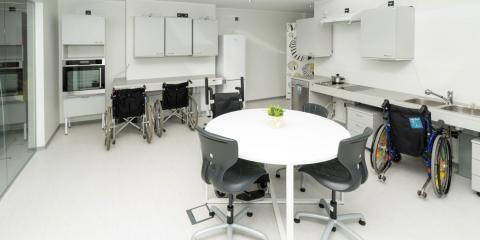Occupational Therapist

Occupational therapist is a specialist with professional higher education in the areas of activity and occupational performance, who uses every-day activities as an instrument in one’s work. Occupational therapy focuses on human being, aspiring to maintain and achieve optimal functional capability and quality of life in person’s everyday life and natural environment. During the studies there is a rotation of lectures, seminars and practices. At the end of every academic year students do practice outside the UAS in different practical training bases. Occupational therapists can work in hospitals, social and health care institutions, open care, nursery schools, schools, caring homes, as a member of rehabilitation team or as an independent specialist. Graduates will be awarded Bachelor of Science in Health Sciences (BSc) and occupational therapist, level 6 occupational certificate.
The curriculum is in accordance with the World Federation of Occupational Therapists (WFOT) Minimum Standards for the Education of Occupational Therapists.
Nominal length of study: 4 years
Language of studies: Estonian language
The Tallinn Health University of Applied Sciences occupational therapist study programme corresponds to higher education standard and European Union directives regulating integrated theory and practice studies. As our institution participates in several international cooperation programs, the students have an opportunity to study as exchange students in various European countries. Thus, good English skills are important.
Aim of the curriculum
The aim of the Curriculum of Occupational Therapist is to train occupational therapists with professional higher education needed in social care, health care and educational institutions; to provide contemporary knowledge about society together with speciality studies, in order to enhance the growth of the students´ professional identity and promote the graduates´ managing in labour market.
Learning outcomes of the curriculum
- Has a systematic overview about the profession´s concepts, theoretical principles, professional ethics, about carrying out occupational therapy for individuals of all ages and applying the knowledge in practice.
- Has an overview of directions and factors having influence on occupational therapist´s job at local as well as international level, and understands connections between occupational performance, health and well-being.
- Is tolerant towards the diversity of attitudes and values, and is able to value and respect individual differences, cultural beliefs, customs and their influence on activity and participation.
- Commands communicational, customer service, and team work skills necessary for one´s work and is capable to include and empower others.
- Has an overview about the basics of research and research methods in the field of occupational therapy, is able to create and defend his/her graduation thesis, considering ethical aspects and legislative requirements for the research.
- Acquires principles of lifelong learning and values application of them in professional development as an occupational therapist.
- Is able to recognize interdisciplinary connections in the application areas of adjacent specialties and understands the role of them in empowering people.
- Is able orally and in written form to explain problems related to occupational therapy in study language and in English, and participate in professional discussions.